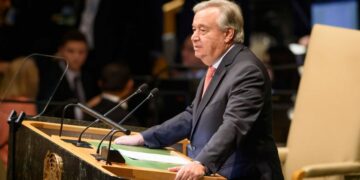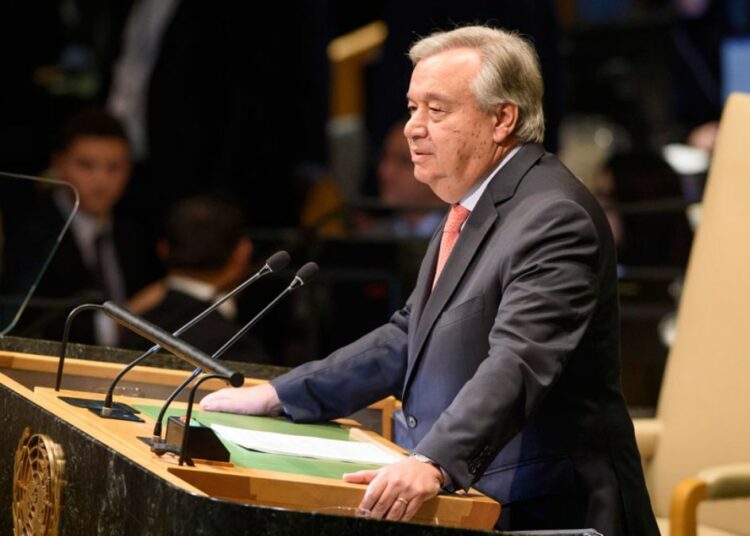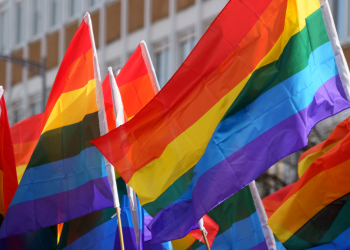Addressing the 76th Session of the UN General Assembly on September 21, 2021, the first day of its high-level General Debate, Secretary-General António Guterres spoke passionately about the precarious state of the world. “I’m here to sound the alarm. The world must wake up. We are on the edge of an abyss—and moving in the wrong direction. Our world has never been more threatened. Or more divided. We face the greatest cascade of crises in our lifetimes.”
These crises include, he continued, political upheaval, mistrust and misinformation, assault on human rights and science, poverty, COVID-19, and climate change. He spoke also of the need to bridge the six “great divides”—the peace divide, the climate divide, the rich-versus-poor divide, the gender divide, the digital divide, and the generational divide. And pointing to a widespread loss of faith “in the values that have animated the work of the United Nations for over 75 years,” the Secretary-General declared, “like never before, core values are in the crosshairs.”
What he unfortunately failed to mention was what the UN founders acknowledged as the foundational core value. All the rights named in the Universal Declaration of Human Rights are individual rights with one exception—the rights belonging to a group unit, the only one named, which precedes the State and is entitled to protection by it: “The family is the natural and fundamental group unit of society and is entitled to protection by society and the State.”
The meaning is unmistakable, according to human rights lawyer and judge Manfred Nowak: the phrase “natural and fundamental group unit of society” was intended “to emphasize that despite various traditions and social structures, a pillar of all societies is the family as the smallest group unit,” while the phrase “entitled to protection by society and the State” was meant to “shield the family as the cornerstone of the entire social order.”
Professor Richard Wilkins added that “as reflected in the precise and elegant terms of the Universal Declaration,” the word “natural attests that the survival of society depends on the positive outcomes derived from the natural union of a man and a woman,” making it “the cradle—not only of human rights—but also of society and civilization itself.”
No wonder Ambassador Michael Novak could declare that “The roles of a father and a mother, and of children with respect to them, is the absolutely critical center of social force,” and could add that “Throughout history, nations have been able to survive a multiplicity of disasters—invasions, famines, earthquakes, epidemics, depressions—but they have never been able to survive the disintegration of the family.”
His warning calls to mind what those of us traveling years ago with Ambassador Ellen Sauerbrey heard as we sat in the office of the president of a Central American republic. Drowning in corruption, crime, drugs, trafficking, and a host of other debilitating challenges, his country would soon be considered a failed state. Why such intractable problems? They all arose, he explained, from the failure of the family.
Our current worldwide crisis mentioned by the Secretary-General is the crisis of that Central American republic writ large—a global failure of the family. Adding to the problem is the fact that the family is indeed “in the crosshairs” of enemies—including, ironically, some in the United Nations itself! It is not Guterres’ doing, of course; he came to his position long after powerful and lavishly funded NGOs operating in the United Nations had begun countering its original vision and values, as described by Gabriel Kuby:
Within a few decades, the UN became an institution that would use its power and resources to change the image of humanity as declared by the Universal Declaration of Human Rights and to replace universal moral values with relativistic postmodern ‘values’ as the foundation of culture…. Today the UN and its powerful sub-organizations fight for dissolution of men’s and women’s sexual identity [and] elimination of marriage and family.
Can it be mere coincidence that the greatest worldwide assault on the family is now taking place at the very time when we are experiencing what the Secretary-General calls “the greatest cascade of crises in our lifetimes,” placing us “on the edge of an abyss”?
Less than two decades ago at the 10th anniversary of the International Year of the Family, the General Assembly heard US representative Wade Horn proclaim, “The state’s foremost obligation… is to respect, defend, and protect the family as an institution.” To forget that obligation may well be as hazardous for us as forgetting was for the ancient Israelites who entered the Promised Land. “Beware that you do not forget the Lord your God by not keeping His commandments,” Moses warned, for “if you by any means forget…, I testify against you this day that you shall surely perish.”
Rudyard Kipling wrote, “Lord God of Hosts, be with us yet, Lest we forget—lest we forget!” Those immortal words call us to remember that the family is, as Wade Horn also told the General Assembly, “the foundation of the social order, the bedrock of nations, and the bastion of civilization”—and we must act now to protect and strengthen it.




















Discussion about this post